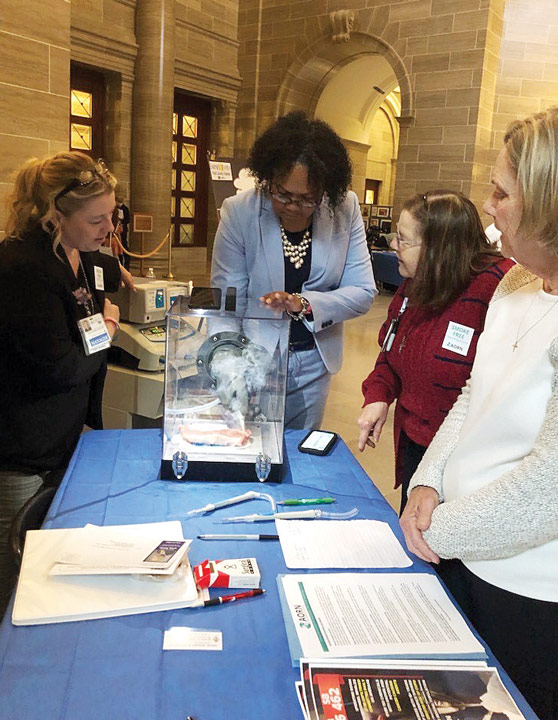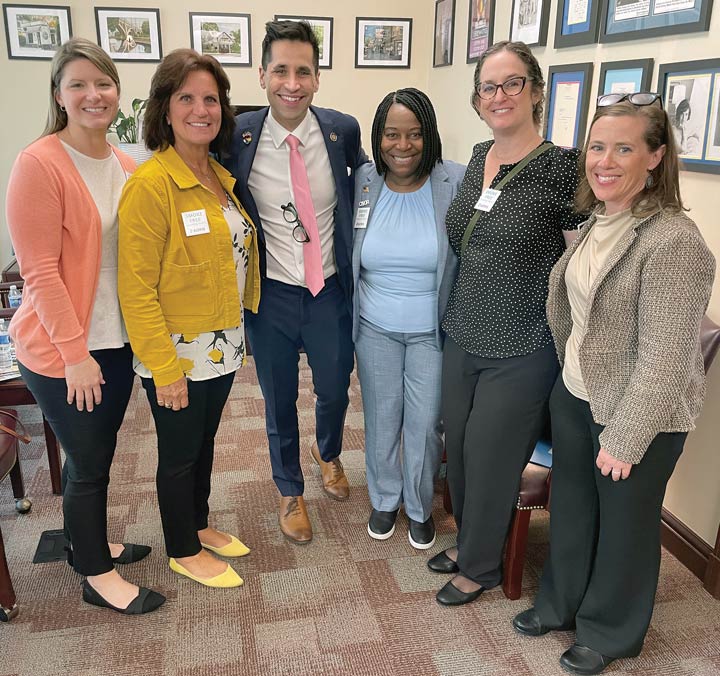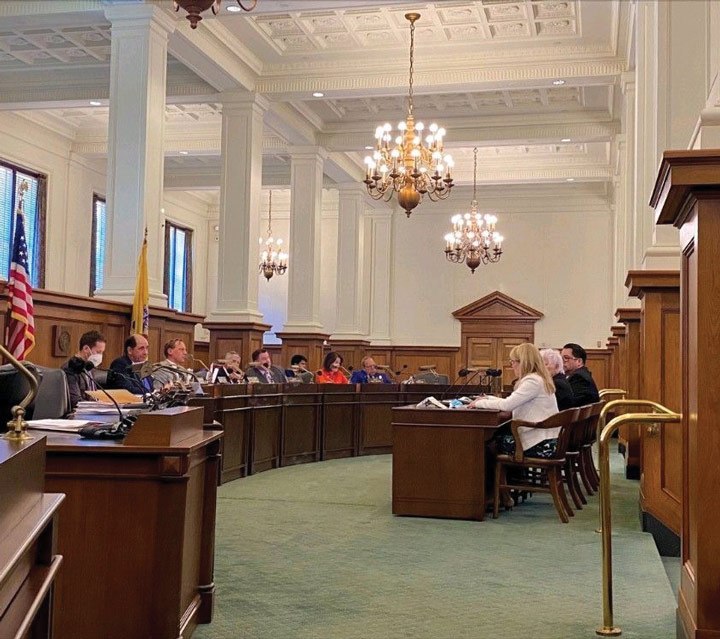- Home
- Article
Your Smoke Evacuation Legislation Playbook for 2025
By: Jennifer Pennock | Contributing Editor
Published: 2/4/2025
With nine states poised to consider bills this year, here’s how you can help turn them into laws.
The effort to pass mandatory surgical smoke evacuation legislation in statehouses across the U.S. continues in 2025 with the ultimate goal of removing toxic plume from the air of every OR in every state. This is an all-hands-on-deck endeavor that includes scores of perioperative nurses and other OR team members who are concerned about the potential long-term health effects of breathing in the hazardous materials that fill the air during electrosurgical procedures day after day, week after week, year after year.
Cornerstone of AORN advocacy

As associate director of government affairs for the Association of periOperative Registered Nurses (AORN), I have witnessed and assisted this collective and determined effort for many years now. AORN Government Affairs advocates for members, patients and the entire perioperative team by fighting daily for the issues that affect the profession and patient safety, and by promoting policies and programs to advance the agenda of perioperative nursing. Surgical smoke evacuation is one of the cornerstones of this policy agenda.
AORN has worked for decades to educate surgical teams about the dangers of surgical smoke and the importance of evacuating surgical smoke to protect the health and safety of everyone in the OR. Through AORN’s Go Clear program, hundreds of facilities across the country have taken the critical step to go surgical smoke-free.
AORN and our members are not content to simply help make individual facilities surgical smoke-free, however. Together, we have worked on surgical smoke evacuation legislation across the country, and the effort has produced significant results.
Beginning in 2018 and continuing each year through 2024, 18 states have enacted surgical smoke evacuation laws: Arizona, California, Colorado, Connecticut, Georgia, Illinois, Kentucky, Louisiana, Minnesota, Missouri, New Jersey, New York, Ohio, Oregon, Rhode Island, Virginia, Washington and West Virginia.
These are big wins, but with 32 states still lacking smoke evacuation laws, we’re not done by a long shot, and 2025 is shaping up to be another big step forward for the smoke-free movement.
Is your state in play?
In 2025, AORN expects legislators in at least nine states to consider smoke evacuation bills. Those states are Arkansas, Delaware, Florida, Massachusetts, North Carolina, Oklahoma, Pennsylvania, South Carolina and Texas.
Advocacy work is already underway in those nine states to pass surgical smoke evacuation legislation in 2025. If you live or work in one of these states, you can get involved in grassroots efforts to support your state’s bill. For example:
In Arkansas, Delaware, Florida, North Carolina, Oklahoma and Pennsylvania, the state nurses’ associations are leading the advocacy efforts to see surgical smoke evacuation legislation enacted. Nurses in these states can support these efforts by joining their state association, subscribing to its newsletters and participating in its lobbying and advocacy events.
In South Carolina and Texas, AORN members are leading the advocacy efforts with support from the state nurses’ associations and other interested parties.
It might be easier than you think to evacuate surgical smoke from your ORs. Several fluid management systems have built-in smoke evacuation functionality, as do some laparoscopic insufflators and electrosurgical units (ESUs). If you’re unsure whether your current devices and equipment already have smoke evacuation capability, reach out to the manufacturer to ensure you have the correct accessories, such as tubing and filters, and whether vendor reps are available to educate your staff on how to correctly use the product’s smoke evacuation function.
—Joe Paone
In Massachusetts, the nurses’ union has developed legislation with support from AORN and American Nurses Association-Massachusetts. Though nursing organizations are taking the lead, they welcome the support and advocacy of surgeons, techs and other providers, their concerned families and friends, and other interested parties. Anyone can be involved in surgical smoke advocacy efforts, even those who don’t work full-time in ORs, such as nursing students and retired nurses.
AORN Government Affairs has found it helpful for legislators to hear from perioperative nurses who work in a variety of areas: inpatient hospital ORs; pediatrics, obstetrics and gynecology; ambulatory surgery centers and more. This variety of voices paints a broad picture for the legislators. It shows just how widespread of a hazard surgical smoke is.
Here are just some of the things you can do to make a difference in states where smoke evacuation bills are under consideration:
- Contact your legislators to share your surgical smoke story and to express your support for the legislation.
- Share information about the bill with your colleagues, family members and friends and encourage them to show their support.
- If you are an AORN member, talk with your fellow chapter members to encourage them to share their stories with legislators and show their support for the bill.
- Respond to AORN advocacy requests when your bill is coming up for a vote.
But my state isn’t considering a bill...
If you live in a state that doesn’t have a smoke evacuation bill drafted yet, you don’t need to wait to act. Instead, preemptively look to:
- Talk with your colleagues about surgical smoke evacuation and the need for legislation in your state. Gauge their interest and commitment to smoke evacuation advocacy work.
- Educate your surgical team members — surgeons, nurses, anesthesia providers, surgical technologists and others — about the hazards of surgical smoke. Many surgical providers still don’t know about the potential danger of working hours upon hours in smoky ORs.
- Identify colleagues who would be willing to support legislation with testimony or written letters and collect their stories about exposure to surgical smoke.
- If you’re a nurse, join your state nurses’ association and seek to educate its legislative or government affairs committee about the hazards of toxic plume.
- Tap into the expertise and resources provided by AORN Government Affairs.
Broad agreement

We live in a highly polarized political environment. Fortunately, surgical smoke evacuation policy is not part of that polarization. It’s not another red state/blue state issue. Quite the opposite, actually.
In every state where surgical smoke evacuation legislation has been enacted, there’s been overwhelming bipartisan support for our bills when they came before the full legislative bodies for a vote. Legislators from both major parties in various states have sponsored our bills and championed them among their colleagues to ultimately get them passed.
Opposition to smoke evacuation legislation does exist, however. A big key to our success has been neutralizing opposition from certain stakeholders, particularly state hospital associations or ambulatory surgery center associations. On behalf of their members, these associations often oppose legislation that they assume will place additional regulatory burdens on their facilities.
This is an area in which the work of AORN Government Affairs has proven effective. As surgical smoke evacuation legislation is drafted and introduced in a state, we engage and work with opposing stakeholders to educate them on the dangers of surgical smoke, the prevalence of equipment already available to evacuate surgical smoke and the need for legislation to ensure that harmful surgical smoke is evacuated in every OR statewide. One way we do this is by conducting a statewide AORN member survey to determine the availability and usage of surgical smoke evacuation equipment in the state.
We also work with opposition stakeholders to address their concerns, such as minor language change requests they might have or requests for additional time to comply with the requirements of the bill. Overall, AORN Government Affairs works to get stakeholder associations to support or to a point of neutrality on smoke evacuation bills, which boosts legislators’ confidence that there is no opposition to the bill and makes them more likely to vote in its favor.
AORN Government Affairs also engages the state agencies that may be involved in implementation and compliance procedures associated with the bills, as well as with the governors’ offices, to educate them not only on the hazards and the need to evacuate surgical smoke from every OR in the state, but also the necessity for legislation to ensure perioperative staff are protected in the workplace.
As evidenced in the 18 states now enforcing surgical smoke evacuation laws, advocacy efforts by individual frontline nurses and other perioperative professionals are vital in moving these legislative initiatives forward. For example, the dedication of the late Angela Hohn, RN, BSN, BS, CNOR, FCN, a perioperative nurse in the Atlanta VA Health Care System, proved crucial in the passing of Georgia’s surgical smoke evacuation law. To better understand the enormous impact a single healthcare provider can make in any given state, read our March 2021 cover story about Angela and her role in the ultimately successful Peach State effort.
—Joe Paone
A marathon, not a sprint

The recent successes in the enactment of surgical smoke evacuation legislation across the country may make the process seem quick and easy, but that’s far from the case. Laying the groundwork and finding the right legislator to introduce surgical smoke evacuation legislation can take time, and it’s rare for legislation to be enacted during the very first session it is introduced.
It can take years of reintroducing the same bill to cross the finish line. That includes spending the time between sessions to engage legislators on the issue and invite them to chapter meetings or smoke evacuation demonstrations.
Getting any bill passed, including one related to surgical smoke evacuation, takes time, effort and collaboration. It’s a collective endeavor, and you can be part of it by devoting as much time and effort as you can — whatever makes sense for you.
Stay up to date on all surgical smoke evacuation legislation across the U.S. by visiting this AORN resource: osmag.net/map. Still stumped about what to do in your state? Contact me directly at [email protected] with the subject line “Surgical smoke advocacy in my state.”
Let’s work together to clear the air in your state’s ORs! OSM
.svg?sfvrsn=be606e78_3)
.svg?sfvrsn=56b2f850_5)